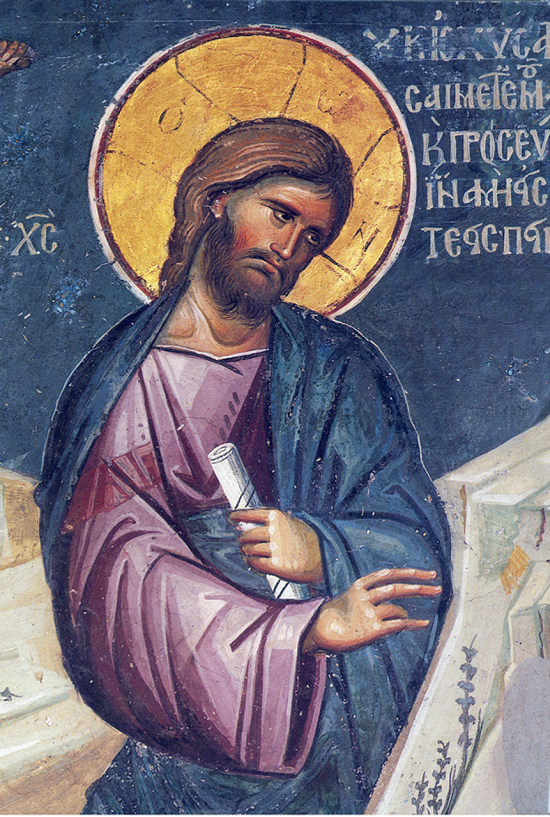Surrender to Win
Fourteenth Sunday Scripture Readings

As Jesus presents it, our human existence plays itself out in a world of strange contrasts. At one extreme is the world as we understand it; at the other is the world as God understands it. We live in this world of paradox. The more we struggle to put our knowledge of life, the universe, and everything to work as we try to remake the world in our own image, the more colossal our failures.
In today’s gospel reading, Jesus prays a prayer of thanksgiving because God has hidden the truth from those he calls the “wise and the learned.” Whom was he talking about? The scribes and the Pharisees. The Pharisees—whose very name means “those set apart”—thought themselves wiser than other people because they could discern the intricate obligations of the Law of Moses. The scribes were those who studied the Law in excruciating detail to familiarize themselves with its finest points. The scribes and the Pharisees believed that, by following the rules and by doing everything they were supposed to do, they’d win in the game of life. When it came to living life on their own terms, each of them thought, “I’ve got this,” and they pitied those who weren’t them.
Jesus prays in the gospel, “…you have hidden these things from the wise and the learned…” What are “these things”? What are the things that the little ones know, but the wise and learned don’t? The little ones—the anawim, the disciples—know that they don’t “got this.” They’ve tried to live life on their own terms and failed. They’ve graduated from the “school of hard knocks.” They’ve tried to be self-made women and men only to discover that they could be unmade just as easily. Some thought—like the scribes and Pharisees—that making all the right choices would bring them sure-fired success, while others figured that the rules didn’t apply to them and they’d boast, “I did it my way.” All of them fell into that same trap, believing that the rules provided them with the key to success—whether they followed or flaunted them.
“Come to me,” Jesus tells us, “all you who labor and are burdened, and I will give you rest.” What is that burden we carry and under which we labor? It’s the burden that comes from the belief that the responsibility for our success or failure as individuals rests on our own shoulders—what we do or fail to do. Take, for example, the yoke of the Law of Moses. For the faithful of Jesus’s time, it was indeed a heavy burden, for they believed that living a good life was dependent on how well they obeyed the commandments—all 613 of them—and kept themselves ritually pure. Many people at that time gave up trying because they found the stipulations of the Law, especially as taught by the scribes and Pharisees, impossible to follow exactly. They saw themselves as hopeless, as people excluded from God’s love.
No wonder Jesus says to those people, “Take my yoke upon you…for my yoke is easy and my burden light.” Jesus didn’t leave his followers guessing about the nature of his yoke. He tells them right out: “…for I am meek and humble of heart.” It’s not about what we as Jesus’s disciples do or don’t do that determines our success. It’s all about our attitude toward life, giving up the illusion of control over our own destiny and accepting—meekly and humbly—to live life on life’s terms. That means accepting that things are as they are and not as we wish they were. It means accepting that we’re powerless to change anything outside the boundary of our own skin. It means giving up the fantasy that things would be different if only… It means that nothing that we have—not intelligence, not learning, not strength, not wealth, power, or prestige, not even our own virtue—can bring us happiness.
“…learn from me, for I am meek and humble of heart.” In other words, surrender to win. It means not only saying, “I can’t, God can, I think I’ll let him,” but it means taking those words to heart and making them our mantra. The biggest and most significant change in my life happened thirty-seven years ago when my own devices finally brought me to my knees and I said, “It’s time. Time for me to resign as general manager of the universe. The job’s too hard; I can’t do it anymore.” You see, until you resign, until you give up trying to control anybody or anything until you surrender, there’s no space in you for God’s grace to operate. When you’re in control, there’s only space enough for you and your wants and your needs and your plans and your decisions. But once you surrender, once you can truthfully say, “I don’t know which way to go; I don’t know what’s best for me; I don’t know what’s right or wrong anymore; I’m fresh out of wisdom and knowledge;” only then will you allow God the space to work in and for you. Surrender to win.
There’s a wisdom in surrender that comes from beyond our human understanding. What’s the will of God for me? Who can know the will of God? Who can fathom the infinite? Here’s what Jesus said to his followers: “All things have been handed over to me by my Father.” In his emptiness, Jesus is filled with the fullness of God. “No one knows the Father except the Son and anyone to whom the Son wishes to reveal him.” And who are they? They are the meek and the humble of heart. They are we who hunger and thirst for the righteousness of God’s grace. They are we who seek the will of God even in the darkness of suffering and sadness. They are we when we take the yoke of acceptance and surrender to the will of God upon us. Only then will we truly find rest for ourselves. His yoke indeed is easy. His burden indeed is light.
Get articles from H. Les Brown delivered to your email inbox.
